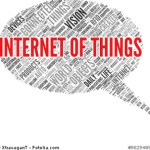Intelligent devices that learn to think and organize themselves? And as well being power efficient in applying them and gaining benefits in the environment in which they are used? The idea which could result of a science fiction movie is one of the biggest trends topics at the SPS 2014, Europe’s leading exhibition for electric automation, which takes place in Nuremberg from the 25th to 27th of November (p.s. you can visit us in Hall 7, Booth 306). The key word is the “Internet of Things” (IoT) which means that IT objects are intelligent and can exchange information via the Internet with other devices or people. The aim of the Internet of Things is to combine the virtual with the real world.

Up to 30 Billion Intelligent Devices in 2020
Cloud Computing, Industry 4.0, Big Data – these are just some of the keywords that fall in the environment of the Internet of Things. The market research firm Gartner predicts that about 26 billion devices will be connected to the Internet in 2020. ABI Research expects that this figure could be even more than 30 billion. Many of these devices are collecting data from the physical world and provide the data world. But how is it possible to develop applications that exploit the potential of the IoT?
Power Efficiency in Production
The world’s rising energy and raw material costs and the associated environmental considerations are a reason for many companies to implement energy- and resource-efficient processes in production. One instrument is sensor technology which is measuring the power consumption of big industrial machines. The so-called energy monitoring and the possible systematic optimization is the first step in the right direction and has already been tested by larger companies or corporations.
But how can Companies benefit from this technological Wave?
One aspect of integrating an Internet of Things solution is to visualize the data that are generated by the field devices. A demonstration application shows then, for example, how the machine, which is connected to the network, is consuming power and how it can be optimized in downtime. The user gets these results in real time and can optimize his processes just in time. So he can enhance his ROI in reducing development cost, and keeping maintenance expenses short.
Data Security fundamental
One critical topic which comes along with data collection is the question: Who actually owns the data which is generated and how do we implement security algorithms for the data exchange? This topic is actually discussed and cannot be answered yet.
IoT even in everyday Life
Potentially, the IoT could touch many aspects of life — from connected homes and cities, to connected cars and roads, to devices that track an individual’s behavior and use the data collected for “push” Services.
In my opionion the Internet of things opens a huge new world of using smart and mobile devices in any environment. Especially in our home. Who does not dream of an intelligent heating or refrigerator? What do you think – is the Internet of Things an ecological device of the future?

{{comment.comment}}